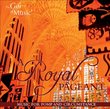| All Artists: Erich Kleiber Title: Kleiber Members Wishing: 0 Total Copies: 0 Label: Artone Release Date: 4/27/2006 Album Type: Box set, Import, Limited Edition Genre: Classical Style: Number of Discs: 4 SwapaCD Credits: 4 UPC: 4011222223555 |
Search - Erich Kleiber :: Kleiber
 | Erich Kleiber Kleiber Genre: Classical
|
Larger Image |
CD DetailsSimilar CDs
|
CD ReviewsA wide ranging musical sampling of Kleiber's work Steven A. Peterson | Hershey, PA (Born in Kewanee, IL) | 12/13/2008 (5 out of 5 stars) "This represents a wide ranging introduction to Erich Kleiber's musical corpus. He was born in 1890 and dies in 1956. In a musical oddity, his son, Carlos, also became a well known, well regarded conductor. This 4 CD set includes a fascinating array of works--Mozart's Symphony # 40, Liszt's "Les Preludes," Johann Strauss' "Die Fledermaus" overture, Richard Strauss' "Till Eulenspiegels Iustige Streiche" and Waltz from "Der Rosenkavalier," Nicolai's "Merry Wives of Windsor" overture, Beethoven's Symphony # 9, Schubert's Symphonies #8 and #8, Tchaikovsky's Symphony # 6, Dvorak's "Carnival" overture, and Smetana's "Moldau." In short, quite a music potpourri! In a short review, it's only possible to discuss a sampling of these works. So, let's take a look at a handful of the recorded items in this set. Mozart's Symphony # 40: One of my favorite Mozart symphonies. . . . The first movement begins crisply, clearly "Allegro molto." The orchestra plays well and this is lively music indeed. The second movement is taken at a rather crisp pace, even though Mozart notes that this is "Andante." The London Philharmonic plays this well (it was recorded in 1949). A stately sound. The third movement could also be described as stately. There is energy in the music. Finally, the fourth movement. This begins at a sprightly tempo. The work is actually infectious, closing out nicely with considerable spirit. J. Strauss, Overture to "Die Fledermaus": What a musical bon-bon this is! This is a 1933 recording by the Berlin Philharmonic. The sound is not as fresh as one might like, given the recording technology of the era. Still it holds up pretty well. There is much brio at the outset, as would be expected with this "toe tapping" music. The orchestra plays cleanly and the finale is terrific. Beethoven, Symphony # 9: Kleiber and The Vienna Philharmonic recorded this in 1952. The first movement begins with its sense of (as I experience it) mystery. There are some tempos that, to me, seem a bit slow, but--overall-- this is played well; it surely ends nicely. The scherzo (Movement # 2) is not quite as "vivace" as the tempo specified by Beethoven, "Molto vivace," would indicate. Nonetheless, a fine piece of music and it finishes well. The third movement is elegiac, describing the orchestra's playing of this exquisite piece. The finale, movement # 4, opens in appropriately cacophonous style. This movement is not as animated as other versions. The "Ode to Joy" theme develops well, although a bit understated. When the bass begins the choral portion, the musical tension increases, although the pace is not as crisp as other versions (you can get a sense of my biases from such comments). The wonderful march? A bit plodding, but fine in its own right. The finale is played at presto and is lively and compelling indeed. A fine--but not in my mind a great version. Smetana, "The Moldau": This is an even older recording (1929--with Staatskapelle Berlin playing the music. The opening is at a quick tempo, with the different instruments coming through cleanly and quite discernible. The sound is rather dry; there are also some other indicators of the age of this recording. The end result, nonetheless, is quite pleasant. As all decent versions, this piece builds toward a crescendo, imitating the Moldau River itself as it begins as a small stream and ends as a large river. Kleiber's conducting, with the orchestra supporting him, produces an enjoyable version of this golden oldie. For the listener who wants a sense of the art of Erich Kleiber, this is a great start. For a good price, one gets 4 CDs, cutting across very different types of music. I enjoyed learning about the craft of this conductor, someone about whom I had little knowledge. So, my small investment in purchasing this was richly rewarded. " Another worth Kleiber set Sergey Sh. | Moscow Russia | 10/31/2007 (5 out of 5 stars) "The set contains some rare recordings that I have't found in other Kleiber issues - Straus's Till, J.Strauss Fledermaus, Thchaikovsky's 6 Symphony. Also there is interesting 20 pages booklet with photos describing Kleiber biography. The most inspiring performances for me from this set are G-moll symphony, Fledermaus (with Berliner Philharmoniker) and Unfinished (also with BPO, 1935)."
|

 Track Listings (12) - Disc #1
Track Listings (12) - Disc #1


